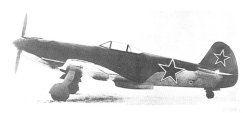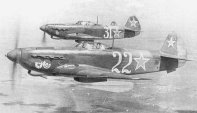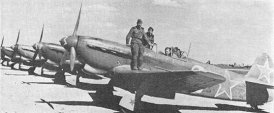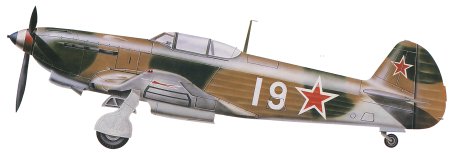
Yakovlev 9
Based on the Yak-7, the Yak-9 had metal wing spars to make room for additional fuel. Deliveries started in August 1942 and by October the type was in action at Stalingrad. The new fighter proved popular with its pilots, despite its limited armament of one 20 mm (0.79 in) cannon and a single 12.7 mm (0.50 cal) machine gun. By mid-1944 there were more Yak-9s in Soviet service than all other fighters put together and the final variant fought in the Korean War.
Compared with the earlier Yak-7B, the Yak-9 had a retractable tailwheel and just a single 12.7 mm (0.50 cal) machine-gun in the forward fuselage, where the previous model had two. The cockpit was moved slightly aft and the radiator was moved forward, but otherwise it was externally similar. However, there were frequent later modifications to meet operational requirements.
The Yak-9D had fuel capacity increased to 650 litres (172 gal) and was powered by a 1014-kW (1,360 hp) M-105PF-3 engine, while the -9DD had its fuel capacity increased to 880 litres (233 gal) for operations over Romania and Yugoslavia. The -9T carried a 37 mm (1.47 in) cannon for anti-tank missions.
A more radical change was to all-metal Yak-9U, which flew for the first time early in 1943. Powered by a 1230-kW (1,650 hp) engine, it was capable of 670 km/h (415 mph) but development was delayed by the loss of the prototype on an early test flight and it did not become operational unitl late 1944.
The all-weather Yak-9P did not appear until after the war. It was to be Yakovlev's last piston-engined fighter and it was exported to several Soviet-allied countries.
 |
 |
 |
| German pilots were given orders to avoid combat with any Yakovlev fighter fitted with an air scoop because of the superior handling of such design in a dogfight. |
Having been produced in larger numbers than any other Russian fighter, the Yak-9 saw continuous action against German Fw 190s and Bf 109s and always gave an excellent account to itself. |
Widely regarded as the most important fighter of the Great Patriotic War, the Yak-9 was the mount of many of the top-scoring Soviet aces of World War II. |
|
Yakovlev 9 (Technical Specification) |
| Role |
Single-seat long-range fighter/ground attack aircraft |
| Manufacturer |
Yakovlev |
| Maximum Speed |
597 kmh (370 mph) |
| Maximum Range |
1,360 km (843 mil) |
| Ceiling |
10,000 meters (33,000 feet) |
Weight
Empty
Maximum Takeoff |
2,420 kg (5,324 lbs)
3,115 kg (6,850 lbs) |
Dimensions
Wingspan
Length
Height
Wing Area |
9.74 meters (31 ft 11 in)
8.50 meters (27 ft 10 in)
2.60 meters (8 ft 6 in)
17.15 square meters (185 sq ft) |
| Engines |
One Klimov VK-105PF-1 liquid-cooled piston engine which provides 940-kW (1,260 hp) |
| Armament |
One 20 mm (0.79 in) ShVAK cannon mounted in the spinner
One 12.7 mm (0.50 cal) machine-guns installed in the engine cowling |
Photo Gallery
Click here to submit your photo
| Have A Passion For Aircraft? |
Subscribe to our 14 series FREE newsletter
delivered weekly on World War 2 Aircraft factfile... |
| NB:- We hate spam as much as you do, so your email address will NEVER be shared with or sold to anyone else. That's a Guarantee. |
|
|





